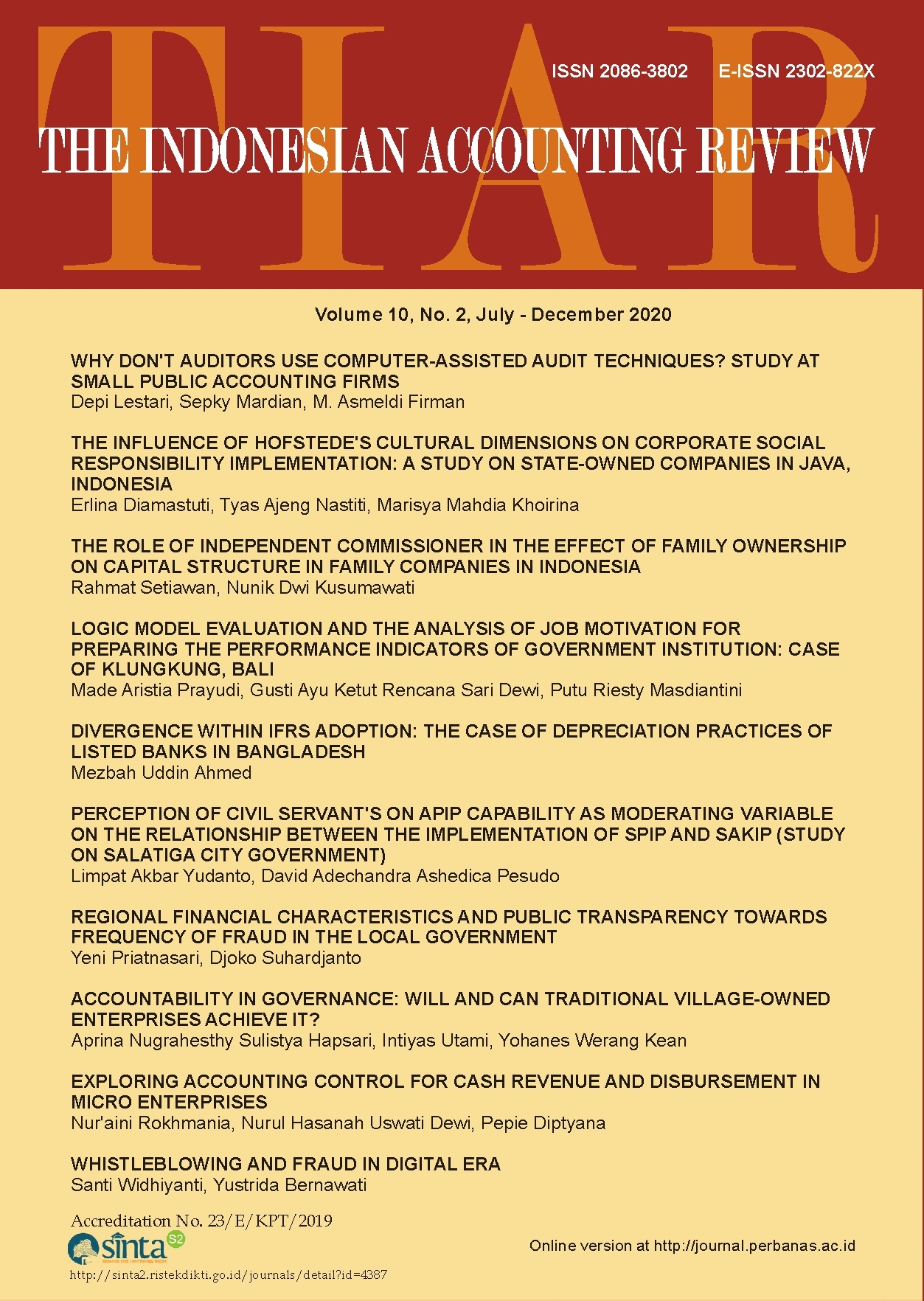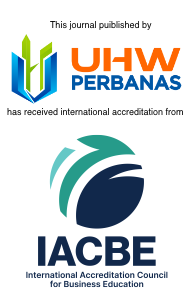Regional financial characteristics and public transparency towards frequency of fraud in the local government
DOI:
https://doi.org/10.14414/tiar.v10i2.2089Keywords:
Frequency fraud, local government financial reports, characteristics of regional finance, public transparencyAbstract
It has been noted that Corruption in Indonesia today has become a crucial problem that cannot be underestimated. Some news about the occurrence of corruption in the local government is quite concerned. This study aims to look at the influence of both financial characteristics and regional public transparency towards fraud frequency in local governments at the provincial level. This research was carried out by quantitative descriptive method by looking at local government financial report data and reports from ACCH (Anti Corruption Clearing House). This study used secondary data, namely in the form of Indonesia Provincial Government’s financial statements and the results of the ACCH report in 2017. The results of this study are expected to provide advice and input in regional financial governance in all the province to be able to reduce frequency fraud in local governments
References
Amaliah, E. F. and Haryanto (2019) “Analisis Faktor-Faktor Yang Memengaruhi Tingkat Pengungkapan Laporan Keuangan Pemerintah Daerah Kabupaten/Kota Di Provinsi Jawa Tengah Tahun 2015-2017,†Diponegoro Journal Of Accounting, 8(2), Hal. 1–13.
Amara, I., Amar, A. Ben and Jarboui, A. (2013) “Detection Of Fraud In Financial Statements: French Companies As A Case Study,†International Journal Of Academic Research In Accounting, Finance And Management Sciences, 3(3), Hal. 456–472. Doi: 10.6007/Ijarafms/V3-I3/34.
Bappenas (2014) Politik Lokal Terhadap Efektifitas Pemerintahan Daerah. Jakarta.
Chen, J. Et Al. (2016) “Does The External Monitoring Effect Of Financial Analysts Deter Corporate Fraud In China ?,†Journal Of Business Ethics. Springer Netherlands, Hal. 727–742. Doi: 10.1007/S10551-014-2393-3.
Dalnial, H. Et Al. (2014) “Detecting Fraudulent Financial Reporting Through Financial Statement Analysis,†Journal Of Advanced Management Science, 2(1), Hal. 17–22. Doi: 10.12720/Joams.2.1.17-22.
Dorminey, J. Et Al. (2012) “The Evolution of Fraud Theory,†27(2), Hal. 555–579. Doi: 10.2308/Iace-50131.
Dorris, B. (2018) “Report to The Nations 2018 Global Study on Occupational Fraud and Abuse Association of Certified Fraud Examiners Foreword President And Ceo, Association Of Certified Fraud Examiners.†Doi: Http://Dx.Doi.Org/10.2139/Ssrn.2222608.
Dye, K. M. (2007) “Corruption and Fraud Detection by Public Sector Auditors,†Edpacs, 36(5–6), Hal. 6–15. Doi: 10.1080/07366980701805026.
Fitzsimons, V. G. (2011) “A Troubled Relationship: Corruption and Reform of The Public Sector In Development,†Mpra Munich Personal Repec Archive, (33932).
Gabrillin, A. (2018) “19 Kepala Daerah Ditetapkan Tersangka Oleh Kpk,†Kompas.Com, 19 Juli. Tersedia Pada: Https://Nasional.Kompas.Com/Read/2018/07/19/07554661/Januari-Juli-2018-19-Kepala-Daerah-Ditetapkan-Tersangka-Oleh-Kpk.
Ghozali, I. (2012) Aplikasi Analisis Multivariate Dengan Program Ibm Spss.
Halim, A. (2008) Akuntansi Keuangan Daerah. Salemba Empat.
Heriningsih, S. (2013) “Pengaruh Opini Audit dan Kinerja Keuangan Pemerintah Daerah ( Studi Empiris Pada Pemerintah Kabupaten Dan Kota Di Pulau Jawa ),†Buletin Ekonomi, 11(1).
Hollinger Dan Clark, J. (1983) Theft By Employees. Lexington, Ma: Dc Heath.
J.Adebisi and D.Gbegi (2015) “Fraud And The Nigerian Public Sector Performance: The Need For Forensic Accounting,†International Journal Of Business, Humanities And Technology, 5(5).
Kaminski, K. A., Sterling Wetzel, T. and Guan, L. (2004) “Can Financial Ratios Detect Fraudulent Financial Reporting?,†Managerial Auditing Journal, 19(1), Hal. 15–28. Doi: 10.1108/02686900410509802.
Khairudin and Erlanda, R. (2016) “Pengaruh Transparansi Dan Akuntabilitas Laporan Keuangan Pemerintah Daerah (Lkpd) Terhadap Tingkat Korupsi Pemerintah Daerah (Studi Pada Pemerintah Kota Se-Sumatera),†Jurnal Akuntansi & Keuangan, 7(2), Hal. 2016.
Kothari, S. P., Shu, S. and Wysocki, P. D. (2009) “Do Managers Withhold Bad News,†Journal Of Accounting Research, 47(1), Hal. 241–276. Doi: 10.1111/J.1475-679x.2008.00318.X.
Kuswandi (2017) “Mendagri: Tahun 2004–2017, 313 Kepala Daerah Tersangkut Kasus Korupsi,†Jawapos.Com, 11 Desember.
Liao, S. S. and Chen, Z. (2014) “The Detection of Fraudulent Financial Statements: An Integrated Language Model Approach Wei,†In Pacific Asia Conference On Information System (Pacis), Hal. 1–17.
Loebbecke, W. (1988) Review of Sec Accounting and Auditing Enforcement Releases. University of Utah.
Lukfiarini (2018) Pengaruh Hasil Audit Bpk-Ri Terhadap Tingkat Korupsi. Universitas Negeri Lampung. Tersedia Pada: Http://Digilib.Unila.Ac.Id/30322/2/Skripsi Tanpa Bab Pembahas%0aan.Pdf. .
Mahmudi (2016) Akuntansi Sektor Publik. UII Press.
Moehrle, S. R. (2011) “Do Firms Charge Use Restructuring to Meet Targets ? Reversals Earnings,†77(2), hal. 397–413.
Moeller, R. R. (2009) Brink’s Modern Internal Auditing. Seventh. Canada: John Wiley & Sons, Inc.
Nurrizkiana, B. et al (2017) “Determinan Transparansi dan Akuntabilitas Pengelolaan Keuangan Daerah dan Implikasinya Terhadap Kepercayaan Public-Stakeholders,†Jurnal Akuntansi dan Investasi, 18(1), hal. 28–47. doi: 10.18196/jai.18159.
Oktaviani, I. A. A., Herawati, N. T. and Tungga, A. (2017) “Pengaruh Praktik Akuntabilitas , Conflict Of Interest Dan Penegakan Hukum Terhadap Potensi Fraud Dalam Pengelolaan Keuangan Desa di Kabupaten Buleleng,†E-Journal S1 Ak Universitas Pendidikan Ganesha, 8(2).
PukatUGM (2014) Trend Corruption Report (TCR), PUKAT, Juli-Desember 2014. doi: 10.3305/nh.2012.27.3.5690.
Puspita, R. and Martani, D. (2013) “Analisa Pengaruh Kinerja dan Karakteristik Pemda Terhadap Tingkat Pengungkapan dan Kualitas Informasi Dalam Website Pemda,†Journal of Chemical Information and Modeling, 53(9), hal. 1689–1699. doi: 10.1017/CBO9781107415324.004.
Sahetapy (2013) Korups di Indonesia. Tersedia pada: http://www.komisihukum.go.id.
Scott WR (1997) Financial Accounting Theory. Diedit oleh S. Edition. Scarborough: Prentice Hall.
Setiawan, W. (2012) Pengaruh Akuntabilitas Laporan Keuangan Pemerintah Daerah (Lkpd) Terhadap Tingkat Korupsi Pemerintah Daerah Di Indonesia. Universitas Diponegoro.
Skousen, C. J., Smith, K. R. and Wright, C. J. (2009) “Detecting and predicting financial statement fraud: The effectiveness of the fraud triangle and SAS No. 99,†Advances in Financial Economics, 13(99), hal. 53–81. doi: 10.1108/S1569-3732(2009)0000013005.
Soepriyanto, G. and Aristiani, R. (2011) “Evaluasi Pengungkapan Laporan Keuangan Daerah di Situs Internet : Studi Pada Pemerintah Daerah Indonesia,†Binus Business Review, 2(1), hal. 192–201.
Stalebrink, O. J. and Sacco, J. F. (2007) “Rationalization of financial statement fraud in government: An Austrian perspective,†Critical Perspectives on Accounting, 18(4), hal. 489–507. doi: 10.1016/j.cpa.2006.01.009.
Tuanakota, T. (2012) Akuntansi Forensik dan Audit Investigatif. Salemba Empat.
Wulandari, R. (2015) Pengaruh Akuntabilitas Laporan Keuangan Pemerintah Daerah (LKPD) dan Kinerja Keuangan Pemerintah Daerah Terhadap Tingkat Korupsi Pemerintah Daerah Di Indonesia. Universitas Islam Negeri Syarif Hidayatullah.
Yang, D., Jiao, H. and Buckland, R. (2017) “The determinants of financial fraud in Chinese firms: Does corporate governance as an institutional innovation matter?,†Technological Forecasting and Social Change. Elsevier, 125(December 2016), hal. 309–320. doi: 10.1016/j.techfore.2017.06.035.
Yunanto (2010) “Intellectual capital disclosure dan karakteristik pemerintah daerah di indonesia,†Tesis.
Ziegenfuss, D. E. (1996) “State and local government fraud survey for 1995 State and local government fraud survey for 1995,†Managerial A, 11(9), hal. 50–55.
Downloads
Additional Files
Submitted
Published
How to Cite
Issue
Section
License
Copyright (c) 2020 The Indonesian Accounting Review

This work is licensed under a Creative Commons Attribution-NonCommercial 4.0 International License.

















